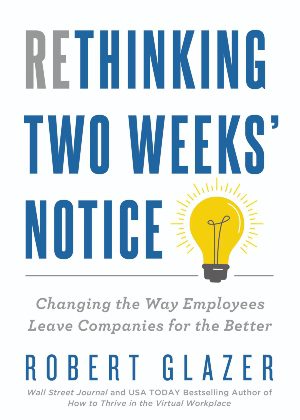
Rethinking Two Weeks' Notice
Changing The Way
Employees Leave Companies
For The Better
“Few life events are more stressful
than quitting a job or being fired. But
is this stress necessary? Robert Glazer
provides a compelling case for a more
humane and natural way to deal with the
inevitability of employees moving on.”
Cal Newport, New York Times Bestselling
Author of Slow Productivity and Deep Work

Available Now!
Praise For Rethinking Two Weeks' Notice

"In his new book Rethinking Two Weeks’ Notice, Robert Glazer details not only how to think differently about team member transitions, but also how to do it with strong ethics and a clear conscience."
International Keynote Speaker and WSJ Bestselling Author of Never Lose an Employee Again

“What if you could keep your best people longer? And when they leave, what if they were a champion for your organization, not an enemy? That's the promise of this book, and its hard-won wisdom delivers."
Bestselling Author of The Coaching Habit

"Robert Glazer presents a refreshing, much needed take on a topic that affects every workplace. His ideas and processes offer a practical approach to employee departures, transforming what is often an abrupt and disruptive process into one of trust, mutual respect, and long-term benefit for both parties. This is a must read for any leader looking to foster a healthier, more transparent workplace culture."
Bestselling Author of Rise of the Youpreneuer and Virtual Freedom

“If your talent is your company’s greatest asset, and the value of your company walks out the door every day, Robert Glazer ensures they walk back in the next day, fully engaged, excited, and inspired. Rethinking Two Weeks’ Notice is a must-read for anyone who manages teams and is invested in their success.”
Wall Street Journal Bestselling Author of Wonderhell

"This book is full of practical tips on how to handle smooth, positive exits that benefit both leaders and employees. Whether coping with professional breakups like sudden resignations or unexpected terminations, Robert Glazer's expertise shines through as he flips the script on outdated norms and practices. It's a must-read for anyone who wants to manage workplace departures with heart and efficiency."
Executive Leadership coach, global speaker, and author

“I often say that life in organizations can be anything we imagine, and in Rethinking Two Weeks' Notice, Bob Glazer reimagines how organizations and employees say goodbye. Beyond that, he outlines how leaders can build more transparent, mutually respectful employment relationships that create lasting value for both sides.”
David L. Boren Professor & Michael F. Price Chair in International Business
Director, Division of Management & International Business
University of Oklahoma

"Robert Glazer's Rethinking Two Weeks' Notice offers a refreshing perspective on workplace transitions where fostering open communication and mutual respect between employee and employer leads to a win-win outcome."
Visionary, The 10 Disciplines and co-author of Shine
Available Now!